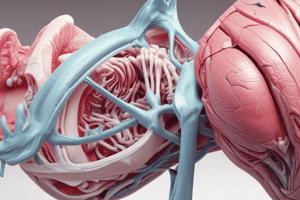Podcast
Questions and Answers
Which of the following muscles is NOT part of the pelvic diaphragm?
Which of the following muscles is NOT part of the pelvic diaphragm?
- Deep Transverse Perineal Muscle (correct)
- Puborectalis
- Coccygeus Muscle
- Pubococcygeus
The pelvic floor includes all the structures of the pelvic diaphragm.
The pelvic floor includes all the structures of the pelvic diaphragm.
True (A)
What are the primary nerves responsible for innervating the pelvic diaphragm?
What are the primary nerves responsible for innervating the pelvic diaphragm?
Sacral Nerve Roots (S2, S3, S4) and Pudendal nerve
The _______ muscle is involved in helping to resist changes in inter-pelvic pressure.
The _______ muscle is involved in helping to resist changes in inter-pelvic pressure.
Match the perineum structures with their purposes:
Match the perineum structures with their purposes:
Which artery provides blood supply to the pelvic diaphragm?
Which artery provides blood supply to the pelvic diaphragm?
The compressor urethrae muscle is present in both men and women.
The compressor urethrae muscle is present in both men and women.
What is the main function of the deep perineal pouch?
What is the main function of the deep perineal pouch?
The _______ nerve supplies the deep perineal pouch.
The _______ nerve supplies the deep perineal pouch.
Which of these structures is part of the pelvic diaphragm?
Which of these structures is part of the pelvic diaphragm?
Which muscle is NOT part of the superficial perineal pouch?
Which muscle is NOT part of the superficial perineal pouch?
The Internal Pudendal Artery supplies blood to the Ischiocavernosus Muscle.
The Internal Pudendal Artery supplies blood to the Ischiocavernosus Muscle.
What structure is located in the superficial layer above the muscles of the superficial perineal pouch?
What structure is located in the superficial layer above the muscles of the superficial perineal pouch?
The __________ nerve branches from the Pudendal Nerve.
The __________ nerve branches from the Pudendal Nerve.
Match the following structures with their respective functions:
Match the following structures with their respective functions:
What is the primary purpose of the muscles in the superficial perineal pouch?
What is the primary purpose of the muscles in the superficial perineal pouch?
Weakness in the pelvic floor can lead to stress urinary incontinence.
Weakness in the pelvic floor can lead to stress urinary incontinence.
What is the relevance of the Broad Ligament with respect to the ovaries?
What is the relevance of the Broad Ligament with respect to the ovaries?
The action phrase 'S2-3-4 keep your __________ off the floor' is used to remember the nerve supply of the pelvic floor.
The action phrase 'S2-3-4 keep your __________ off the floor' is used to remember the nerve supply of the pelvic floor.
Which of the following statements about the Internal Anal sphincter is correct?
Which of the following statements about the Internal Anal sphincter is correct?
Flashcards are hidden until you start studying
Study Notes
Structure Overview
- The perineum anatomy is organized cranially to caudally: Pelvic Diaphragm, Deep Perineal Pouch, Perineal Membrane, Superficial Perineal Pouch.
- Pelvic Diaphragm and Pelvic Floor are distinct entities; the Pelvic Floor encompasses all elements of the Pelvic Diaphragm and other associated structures.
Pelvic Diaphragm
- Composed of muscles: Coccygeus and Levator Ani (which includes Iliococcygeus, Pubococcygeus, Puborectalis).
- Innervated by Sacral Nerve Roots (S2, S3, S4) and Pudendal nerve.
- Blood supply from Inferior Gluteal Artery, Inferior Vesical Artery, and Pudendal Artery.
- Provides foundational support to the pelvic region; critical for preventing urinary and fecal incontinence through relaxation of the puborectalis during bathroom activities.
- Sacrospinous ligament contributes to pelvic stability by limiting movement at the greater and lesser sciatic foramen.
Deep Perineal Pouch
- Contains muscles common to both genders: Deep Transverse Perineal Muscle and External Urethral Sphincter.
- Additional muscles for women include Compressor Urethrae Muscle and Sphincter Urethrovaginalis Muscle.
- Supplied by Perineal Artery and innervated by Perineal Nerve (S2, S3, S4).
- Supports the pelvic diaphragm and plays a role in preventing urinary incontinence.
Perineal Membrane
- Blood supplied by Internal Pudendal Artery; innervated by Perineal Nerve (S2, S3, S4).
- Provides additional support and separates the Deep Perineal Pouch from the Superficial Perineal Pouch.
Superficial Perineal Pouch
- Muscles include Ischiocavernosus, Transverse Perineal Muscle, and Bulbocavernosus (Bulbospongiosus in men).
- Contains the Perineal Body ligament.
- Blood supply from Internal Pudendal Artery (Ischiocavernosus) and Perineal Artery; innervated by Pudendal Nerve (S2, S3, S4).
- Primarily involved in superficial functions like sexual activity and lubrication, rather than deep support.
Pelvic Conditions and Notable Points
- Weakened pelvic floor can cause stress urinary incontinence due to hypermobility of the bladder neck and urethra.
- Internal anal sphincter is associated with the rectum, thus not part of the pelvic floor.
- Broad Ligament indirectly connects to the ovaries but does not comprise the vagina.
- Perineal Nerve branches from the Pudendal Nerve, contributing to pelvic function and sensation.
Studying That Suits You
Use AI to generate personalized quizzes and flashcards to suit your learning preferences.



